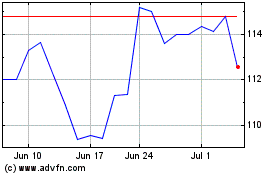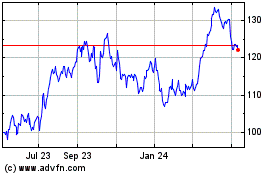By Kejal Vyas in Caracas and Rebecca Elliott in Houston
Venezuela's leader, Nicolás Maduro, is considered likely to
retain power after Sunday's presidential election. But his
government faces a mounting threat from something he can't control:
creditors targeting the oil shipments that provide nearly all the
country's foreign income.
A series of Caribbean court orders in recent days has authorized
U.S. oil giant ConocoPhillips to seize as much as $2.6 billion in
Venezuelan oil from Dutch Caribbean islands as compensation for
assets that Venezuela's Socialist government expropriated from the
company in 2007.
The rulings are a major blow to the cash-strapped and
increasingly isolated nation at a time when its once-thriving state
energy monopoly, Petróleos de Venezuela SA, or PdVSA, has been left
in tatters after years of mismanagement.
Conoco's aggressive actions, the latest in a decadelong legal
battle, threaten to further undermine Venezuela's diminished
ability to store, refine and export crude oil, which it needs in
part to ship to China as repayment for loans.
They follow efforts by a pair of mining companies to enforce
payment of $2.6 billion won in separate arbitration cases. The
companies are now seeking court approval to seize Venezuela's
external assets, including Citgo Petroleum Corp. in the U.S.
Investors holding at least $2.5 billion in defaulted Venezuelan
bonds could also target Venezuelan assets.
Combined with sanctions levied by the U.S. and other countries
across the Americas, Venezuela is facing the tightest noose on its
economy since 1902, said Venezuelan oil economist Orlando Ochoa.
That is when European gunboats blocked its ports to recover unpaid
infrastructure loans.
"This will have a brutal effect for PDVSA'S operational and
storage capabilities," he said.
Spokesmen at PdVSA and Venezuela's oil ministry didn't respond
to calls seeking comment. The oil ministry posted several messages
on its official Twitter account Friday indicating it was ready to
pay the money it owes Conoco. The posts were deleted an hour
later.
Conoco was able to secure the court orders against PdVSA after
winning a $2 billion arbitration ruling last month by a tribunal
representing the Paris-based International Chamber of Commerce. The
company "will pursue all available legal avenues to obtain full and
fair compensation for our expropriated investments in Venezuela,"
said Conoco spokesman Daren Beaudo.
After the ICC ruling, a Curaçao judge on May 4 authorized a
Dutch-registered Conoco subsidiary to target $636 million in oil
products there. The company then began seizing oil cargoes at the
Isla Refinery in Curaçao, which PdVSA leases from the island
government.
Separately, a judge on the island of Bonaire, where PdVSA uses a
10-million-barrel storage facility, authorized Conoco to seize
assets on Bonaire, St. Martin and Aruba to recover $1.5 billion,
plus $449 million in interest.
The court orders led PdVSA to send a dozen tankers back to
Venezuelan waters out of fear of confiscation, according to people
familiar with the matter, prompting the Isla Refinery to shut
down.
More than 16% of all Venezuelan oil exports passed through the
Isla refinery and storage and port facilities in Aruba, Bonaire and
Curaçao last year, according to BMI Research.
"The timing really couldn't be any worse" for Venezuela, said
Mara Roberts Duque, an analyst with BMI Research. "If they're not
able to get those shipments out, even to the degree that they were
able to do so a week ago, that is going to be detrimental to the
Venezuelan government."
Francisco Monaldi, an energy expert at Rice University in
Houston, said Conoco's actions in Curaçao were "a very big blow" to
Venezuela. He said the country has just one domestic terminal where
it can fill the larger tankers used to export crude to Asia.
Conoco's actions haven't been without controversy on Curaçao,
which is concerned over job losses and fuel shortages on the
island. "Shame on you ConocoPhillips for choosing not to fight this
war on your own turf in the energy corridor in Houston," former
Curaçao Prime Minister Maria Liberia-Peters wrote in a public
letter.
ConocoPhillips said it was working with local officials to
address their concerns. "It is PdVSA that has failed to honor our
award by ignoring the judgment of the ICC tribunal," Mr. Beaudo
said.
The decay of the oil industry in Venezuela, which sits atop the
world's largest crude reserves, is a major political concern for
Mr. Maduro, who first became president in 2013 after the death of
populist Hugo Chávez, and has presided over a 40% economic
contraction in the past five years.
Food and medicine shortages are rampant in Venezuela, as the
country struggles to import basics. As many as three million people
have left the country according to some estimates, fleeing
hyperinflation that has rendered salaries, including those of
oil-field and refinery workers, to about $2 a month.
Sunday's election, in which Mr. Maduro is seeking another six
years in power, has been deemed illegitimate by the Trump
administration and much of Latin America.
Over the past year, Mr. Maduro has responded to the oil crisis
by jailing dozens of PdVSA officials on corruption charges and has
placed the management of the industry into the hands of a national
guard general, Manuel Quevedo, who had no prior experience in the
energy business.
A rusting domestic refining network is operating at less than a
quarter of its 1.3 million barrels-per-day capacity, according to
refinery union leader Ivan Freites.
Venezuelan oil production last month fell to its lowest point in
decades, about 1.4 million barrels a day, according to a Monday
report by the Organization of the Petroleum Exporting
Countries.
The decline has left Venezuela unable to benefit from a global
rise in oil prices -- now at their highest levels in more than
three years.
Venezuelan economists say the country is generating revenue from
only about 500,000 barrels daily. Another 300,000 goes to China to
repay loans. The remainder is consumed domestically, where fuel is
virtually free, or given to allies including Cuba at cut-rate
prices.
--Dick Drayer in Curaçao contributed to this article.
Write to Kejal Vyas at kejal.vyas@wsj.com
(END) Dow Jones Newswires
May 16, 2018 15:05 ET (19:05 GMT)
Copyright (c) 2018 Dow Jones & Company, Inc.
ConocoPhillips (NYSE:COP)
Historical Stock Chart
From Mar 2024 to Apr 2024

ConocoPhillips (NYSE:COP)
Historical Stock Chart
From Apr 2023 to Apr 2024
